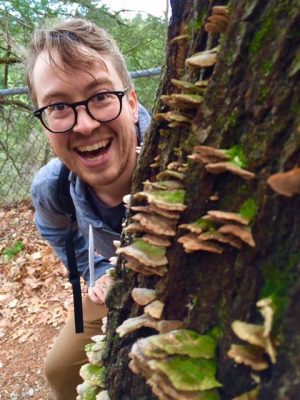Postdoc Spotlight: Spencer Debenport

Spencer Debenport is featured as part of Cornell’s Postdoc Appreciation Week 2016.
What is your area of research?
I study the diversity and function of microorganisms in plants and soils. My main project currently focuses on the impacts of nitrogen deposition on microbial decomposition of forest leaf litter. I am lucky enough to have many side projects collaborating with other labs as well, varying from uncovering the paw paw (Asimina triloba) flower microbiome to identifying potential nitrogen-fixing bacteria associated with grass roots.
What inspired you to choose this field of study?
The field of plant and soil microbial ecology is in a fascinating place right now and is highly attractive for research. Studies in soil microbiology in the past have been limited to those organisms that we can readily culture in the lab, but with the advancement of sequencing technology we are finally able to access those organisms that have evaded our petri dishes. It is a new frontier for discovery of how soils function and the roles of microbes in plant health. Plus, I love spending the summer outdoors in the field and the winter holed up in a café playing with DNA sequences.
Why is this research important?
Just like humans and our gut microbiome, plant and soil microbiomes can have dramatic impacts on the health of a system. Some microorganisms are incredibly useful as biological fertilizers and pesticides and can be used to reduce our dependence on petrochemical based standards. Soil microorganisms are also a critical component of global carbon cycling which influences our models of climate change. Microbial derived chemical compounds can be of incredible importance to human health, with one particular genus of soil bacteria, Streptomyces, producing a large percentage of our antibiotics. We also have naturally occurring grape-associated yeasts to thank for some of our delicious wines! Microbes are present in all aspects of our lives, and now more than ever we are able to study where they are, what they are doing, and their interactions.
How has your background influenced your scholarship?
I was lucky enough to grow up with parents who encouraged a curiosity with nature and embraced my own weirdness. I have always loved fungi; going on hikes and finding these unique organisms that are a bit alien amongst the moss and leaves. In my undergraduate studies I was able to dive into the world of mycology and became fascinated by those little things we can’t see with our own eyes that make up the majority of nature. My parents always let me go off on my own expeditions as a kid—they still display a picture of me standing in the middle of a huge pumpkin patch I grew that took over the yard because I ‘wanted to be a pumpkin farmer’—which I believe instilled this desire to venture off to learn and explore as much as I could. Now most of my exploring is at the lab bench and computer terminal, but I try to carry that passion forward.
What else has influenced your thinking as a researcher or scholar?
This seems to be the standard answer, but I have had some incredible mentors along the way. From my 5th grade science teach who started the year by letting us learn the ecology of crayfish by having two giant kiddie pools full of them in the classroom, to my Ph.D. advisor who trusted me enough to let me live in west Africa for a few years conducting research, I have always had motivating people in my corner. These mentors form the base of the image of both the scientist and the person I hope to be in life. Embrace the weird, take risks, and above all, have fun!
What other hobbies or activities do you enjoy in your spare time?
My fiancée and I love to go hiking every chance we get, but we’re always waylaid by a cool insect or little mushroom that needs its picture taken. I enjoy riding and working on motorcycles during the summer, and knitting during the winter. Board games with a glass of wine or whiskey are always a blast as well!
Why did you choose Cornell?
I came to Cornell out of a bit of serendipity. My current adviser was an invited speaker for a workshop in microbial ecology that I was helping to run in Senegal. As we were talking there, we found that our research interests were very much aligned and that I was happening to finish my degree right at about the same time he was looking for a new postdoc to join the lab. Things worked out well and I moved up to Ithaca within a couple weeks of defending my thesis.
What’s next for you?
I have always been interested in teaching and research, so I will most likely be looking for opportunities in academia as I finish my postdoc experience. I have also been very impressed with the seminars and workshops put on by the Graduate School and Office of Postdoctoral Studies focused on expanding your job search and alternatives to the traditional academic path.
Do you have any advice for current graduate students?
Do not be afraid to seek help from others when you need it! The experience of no two graduate students is exactly the same for a multitude of reasons, but a support structure can be helpful for anyone. Whether it’s family, friends, a therapist, or all of the above, find that network and use it when you need it. Also: enjoy it! Take time to make the most of being on a university campus and expand your boundaries.
Interview by Sally Kral, communications and outreach assistant in the Graduate School
